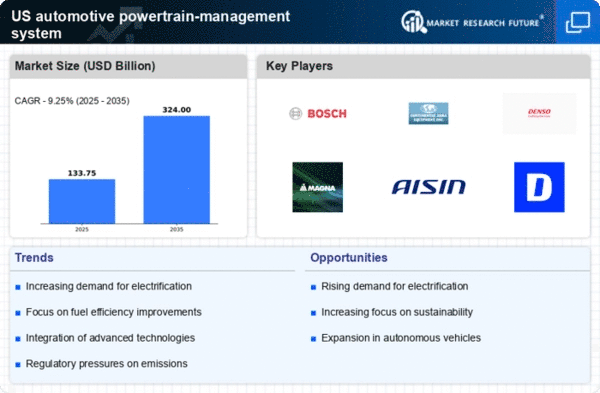Rising Demand for Fuel Efficiency
The automotive powertrain-management-system market is experiencing a notable surge in demand for fuel-efficient vehicles. As consumers become increasingly conscious of fuel costs and environmental impacts, manufacturers are compelled to innovate. The U.S. government has set ambitious fuel economy standards, aiming for an average of 54.5 mpg by 2025. This regulatory pressure drives automakers to invest in advanced powertrain technologies, enhancing efficiency and reducing emissions. Consequently, the automotive powertrain-management-system market is likely to witness significant growth as companies develop systems that optimize fuel consumption and performance. The integration of hybrid and electric powertrains further supports this trend, as these technologies often require sophisticated management systems to maximize their potential. Thus, the push for fuel efficiency is a critical driver shaping the automotive powertrain-management-system market.
Increasing Regulatory Compliance Requirements
The automotive powertrain-management-system market is significantly impacted by increasing regulatory compliance requirements. In the U.S., stringent emissions regulations and fuel economy standards compel manufacturers to adopt advanced powertrain technologies. The Environmental Protection Agency (EPA) has implemented regulations that require a substantial reduction in greenhouse gas emissions from vehicles. This regulatory landscape drives the need for sophisticated powertrain management systems that can monitor and optimize vehicle performance in real-time. As a result, automakers are investing heavily in research and development to meet these compliance standards, which in turn fuels growth in the automotive powertrain-management-system market. The ongoing evolution of regulations suggests that compliance will remain a key driver for innovation and investment in this sector.
Growth of Electric and Hybrid Vehicle Segments
The growth of electric and hybrid vehicle segments is a pivotal driver for the automotive powertrain-management-system market. As the U.S. transitions towards more sustainable transportation solutions, the demand for electric and hybrid vehicles is on the rise. According to industry forecasts, electric vehicle sales are projected to reach 7 million units annually by 2025, reflecting a substantial shift in consumer preferences. This transition necessitates the development of advanced powertrain management systems that can efficiently manage energy distribution, battery performance, and overall vehicle dynamics. Consequently, the automotive powertrain-management-system market is likely to benefit from this growth, as manufacturers invest in innovative solutions to support the evolving landscape of electric and hybrid vehicles.
Technological Advancements in Powertrain Systems
Technological advancements are profoundly influencing the automotive powertrain-management-system market. Innovations in engine design, transmission systems, and hybrid technologies are reshaping how vehicles operate. For instance, the introduction of variable valve timing and turbocharging has improved engine performance while maintaining fuel efficiency. Furthermore, the rise of electric and hybrid vehicles necessitates advanced powertrain management systems to ensure optimal performance and energy utilization. According to recent data, the U.S. electric vehicle market is projected to grow at a CAGR of 20% through 2025, indicating a robust demand for sophisticated powertrain management solutions. As automakers strive to enhance vehicle performance and reduce emissions, the automotive powertrain-management-system market is likely to expand, driven by these technological innovations.
Consumer Preference for Advanced Vehicle Features
Consumer preferences are shifting towards vehicles equipped with advanced features, which is a significant driver for the automotive powertrain-management-system market. Features such as adaptive cruise control, lane-keeping assistance, and automated driving capabilities require sophisticated powertrain management systems to function effectively. As consumers increasingly demand these technologies, automakers are compelled to integrate advanced powertrain solutions that enhance vehicle performance and safety. Market data indicates that the demand for vehicles with advanced driver-assistance systems (ADAS) is expected to grow by over 30% by 2025 in the U.S. This trend suggests that the automotive powertrain-management-system market will continue to expand as manufacturers strive to meet consumer expectations for enhanced vehicle capabilities.
















